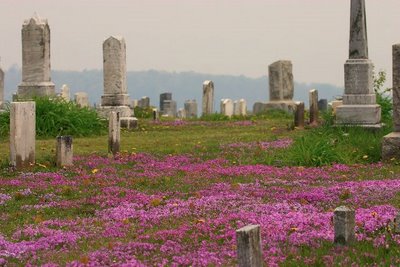
Elegy for a Child
Here are consoling pieties
like a tightly-packed
warehouse
of mortuary statues
through which you
must elbow a path.
Here are sparrows
on a porch
sorting sand from seed
with their beaks.
Here's the hour
that has forgotten
the minute,
though the minnow
remembers the stream.
Here are the roots
in one world,
and the blossom
in the other.
-Gregory Orr, anthologized in The Body Electric
One of my clients works as a hospice nurse. She lost several patients last week and mentioned it during our session. I really admire her ability to handle such a challenging occupation, to be available to those who are about pass beyond this mortal coil.
I've been thinking about her job since that session. I think I could handle the death part of it. People are born, they live, they die. It's all part of the natural process of incarnation. But the part that would rip a hole in me every time is the suffering of the family members.
It seems to me that no matter how much we practice non-attachment, we grieve the loss of friends and family. It isn't weakness, or ego, or some other form of pathology. It's how we celebrate our connection to our fellow beings.
Having said that, loss of a loved one -- or witnessing that loss in others -- is one of the most painful experiences I have known. Even when I am completely separate from the people involved, I feel their pain in ways that make me feel like I have no skin.
I used to think something was wrong with me. I now know that my own experience of loss has left me more sensitive to the experience than some other people might be. That's both good and bad. It would be bad if I worked as a hospice nurse. It's good when my clients are in pain (and several have lost loved ones in the last year) and they simply need to share their loss.
When my father died (I was thirteen), there was no one to tell me that grieving was natural and necessary -- so I did the "stiff upper lip" thing. It took years to unearth that loss from my body -- and I am still working at it.
It has taken me all these years to learn that grieving is how we acknowledge our humanity.
No comments:
Post a Comment